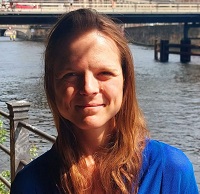Elen Budinova, M.A.

Privat
Viadrina Center of Polish and Ukrainian Studies (VCPU)
PhD CandidateElen Budinova is a student at the International PhD Programme in Social and Cultural Sciences at the European University Viadrina, Frankfurt (Oder). Within the framework of “European Times – A Transregional Approach to the Societies of Central and Eastern Europe” (EUTIM), she is a research associate at the subproject “Comparative History of Science and Humanities in the 20th Century” zooming into a spatiotemporal plurality of social perceptions, intellectual projects and cultural blueprints. Both earned with highest honours, Elen received her BA in Political Science from the Otto Suhr Institute at the Free University of Berlin, and her MA in International Relations (Profile: Global Challenges) from the Humboldt University, Free University of Berlin and University of Potsdam. Entitled “Trajectories of Crimean Separatism: From Prevented Post-Soviet Conflict to Irredentist Overtake”, her MA thesis was awarded the Humboldt-Price of 2019. Parallel to social commitments mainly focusing on empowerment of refugees, her work-related experiences include professional stations at “Prisma Ukraïna – Research Network Eastern Europe” (Forum Transregional Studies, Berlin), the German Corporation for International Cooperation – Portfolio Management: Belarus and Ukraine (Kyїv), the Chair “Entangled History of Ukraine” (European University Viadrina) and the Bulgarian Office of the Friedrich Ebert Foundation (Sofia).
Her PhD-project “Donbas beyond Political Myths: Revisiting the Entangled History of a European Border Region until its Time Collapse 2014 into Separatist Violence and the Outbreak of Russia’s War against Ukraine” offers an interdisciplinary lens on the palimpsest past of Donneččyna and Luhanščyna. Readers time-travel to the often-overlooked historical pages of these two Ukrainian lands nested within Europe’s eastern steppe’s frontier – host of civilizational encounters, migration and trade highways, cultural transfers, attempts at coexistence and new beginnings of various peoples, but also stark hegemonic fault lines, including brute forms of violence and epistemic injustice. Moving towards a much more nuanced picture of local historical experiences and re-affirming their inseparability from the trajectory of the Ukrainian national emancipatory project, the paper creates space for a polyphonic narrative deconstructing unsound arguments entrenched in monotone, essentially flawed stereotype-portrayals of ‘Donbas(s)’ – actually a purely geological signifier rooting in Russo-imperialist colonial extractivist overtones silencing the complex diversity of territory, people and memory by the cliché of old industrial heartland and inherently Russian stronghold transcending borders. The red thread of the project delineates the contrast between the multifaceted regional chronicle and historical myths politically abused in secessionist mobilization dramaturgy and Russian irredentist propaganda repertoires. After this critical historical synthesis, the analytical focus falls on a contextualisation scrutinizing multilevel post-Soviet destabilization dynamics by outweighing internal as well as exogenic factors behind the regional 2014’ time collapse into the limbo of protracted war and humanitarian crisis. Challenging the ‘civil strife’ hypothesis, the research debunks claims pertaining to causality purportedly generated by identity cleavages, structural socioeconomic grievances, Ukrainian state failure or internal repression against local citizens. Provisional findings indicate the key role of the Kremlin’s involvement in terms of not only the 2014’ evidence of a covert military invasion synchronous to aggressive information warfare, substantial material backup, including heavy arms, and superior control over local and foreign conflict entrepreneurs, but also the long legacy of infiltrating Ukrainian institutions, economic blackmail, misuse of intelligence loopholes, toxic injections with political technologies, inflows of protest “tourists” and systematic intimidation of the Ukrainian civil society. Further emphasis of causal importance sheds light on opportunistic (mis)calculations of local elites and the inadequate international community’s response to Russia’s aggression which eight years later morphed into a full-scale invasion mistreating the occupied Crimea and Eastern Ukrainian areas as springboards, and their population as cheap cannon fodder. Though now a war-torn place, the region had multiple times demonstrated its regeneration capability and awaits a revival in free Ukraine. As also the research insights illuminate, it is high time for global appreciation of Ukraine’s political, cultural and historical subjectivity, its embrace on equal terms in the European family of nations, and, though painfully belated, long-term world-wide support in the country’s fight against Russian atavist neo-imperialism, primitive geopolitics and genocidally coloured state terror.